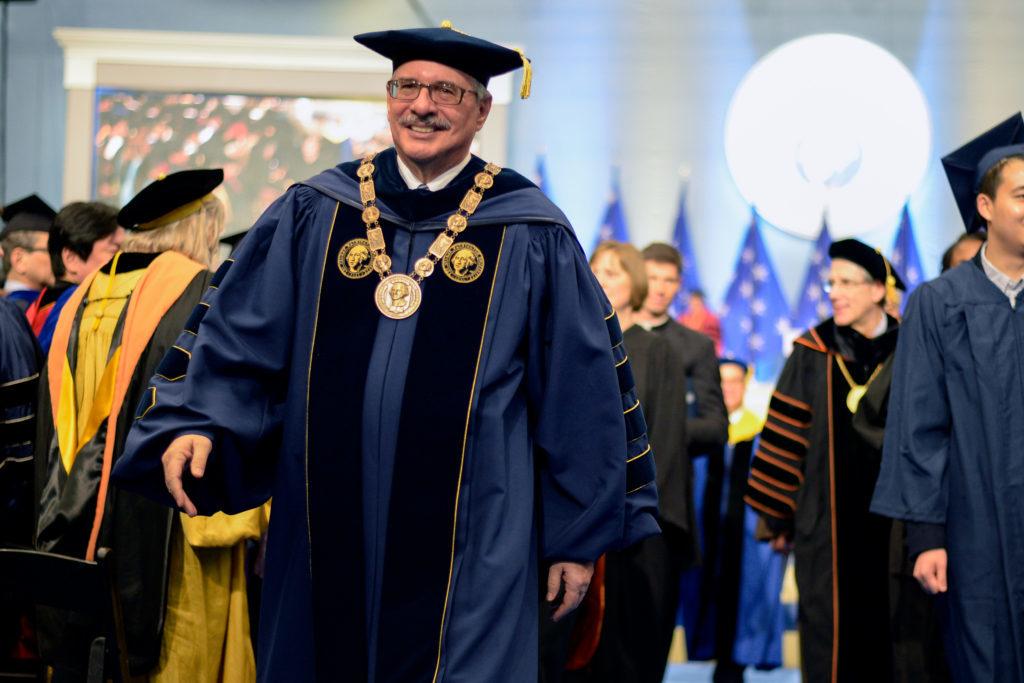It’s been a busy 52 weeks on GW’s campus. The year kicked off with the announcement of a new University president and finished with major departures in the Division of Student Affairs. Allegations of sexual misconduct dominated the news cycle as the Department of Education launched a Title IX investigation against GW. Student activism, from presidential protests to on-campus rallies, made national headlines – and that’s just a taste of all that happened on campus this year.
Here’s a look back at the biggest news of 2017:
LeBlanc takes charge
Just days into the new year, the University announced that Thomas LeBlanc, the executive vice president and provost at the University of Miami, would be GW’s 17th president. The announcement followed the news that former University President Steven Knapp would depart in 2017 after 10 years in his role.
LeBlanc began his tenure laying out bold plans to improve the undergraduate student experience and change GW’s institutional culture. In November, the University spent about $500,000 on LeBlanc’s three-day inauguration, drawing criticism from the student body, who said the funds could have been better allocated.
Students take to the streets
[gwh_image id=”1031493″ credit=”File Photo by Jack Borowiak | Staff Photographer” align=”none” size=”embedded-img”]Students gathered for the People’s Climate March in April.[/gwh_image]
GW lost its title as the most politically active campus in the country in 2017, but students were still front and center at protests across the District. Students were among the throngs gathered on the National Mall in January for President Donald Trump’s inauguration and the Women’s March the next day.
Student activists also rallied to oppose Trump’s proposed travel ban on several Muslim-majority countries and the plan to rollback protections for young undocumented immigrants. Students and faculty also marched in major rallies on scientific research, climate change and racial inequality.
SA election turmoil
[gwh_image id=”1044364″ credit=”File Photo by Sam Hardgrove | Assistant Photo Editor” align=”none” size=”embedded-img”]The Joint Elections Committee disqualified Student Association presidential candidate Lande Watson from the race in April amid allegations of stalking and harassment from an opponent.[/gwh_image]
This year’s Student Association elections were rocked by allegations of harassment and misconduct against former presidential candidate Lande Watson’s campaign team. The vote was postponed while the Joint Elections Committee, the body that oversees SA elections, investigated the charges. Following a 10-hour-long hearing, Watson was kicked out of the race and the presidential election was again postponed to the fall.
Meanwhile, the election for SA executive vice president went ahead with then-sophomore Peak Sen Chua edging out his opponent Sydney Nelson. SA leaders later determined the presidential election could not be held in the fall and Chua assumed the presidency.
RAs set national precedent
After resident advisers pushed to unionize in the fall of 2016, the National Labor Relations Board, ruled in their favor in April, recognizing them as University employees and allowing them to form a union. The decision set a national precedent permitting undergraduate University employees to unionize.
Following the NLRB decision, RAs were set to vote whether to unionize on May 3, but in a surprise move, the local labor group representing RAs withdrew its petition the day before the vote was scheduled, canceling the election. Organizers said they were not consulted about the decision, leaving them confused and frustrated.
$1 billion campaign reaches its goal
[gwh_image id=”1032834″ credit=”File photo by Olivia Anderson | Photo Editor” align=”none” size=”embedded-img”]Then-University President Steven Knapp celebrated GW’s $1 billion fundraising campaign at the senior class gift presentation in May.[/gwh_image]
After a yearslong push to rack up donations, the largest fundraising campaign in University history came to a close this year. Officials announced the $1 billion benchmark had been reached during commencement celebrations in May, about three years after the effort began. The campaign, which concluded a year ahead of schedule, was a signature achievement of former University President Steven Knapp’s administration.
Title IX in the spotlight
In August, the Department of Education began investigating GW for allegedly mishandling a sexual violence complaint. In the complaint that sparked the probe, a student alleged that the University engaged in sex-based discrimination and later retaliated against the student for reporting a sexual assault incident.
The University also ordered an external review of its Title IX policies after its handling of sexual assault came under fire in the spring. Student protests broke out in April after a then-senior and sexual assault survivor accused the University of mishandling a sexual violence case in an online petition that drew widespread attention.
In the fall, LeBlanc committed the University to maintaining Obama-era Title IX guidelines after the Department of Education allowed universities to use a stricter standard of proof in deciding sexual violence cases.
Peter K calls it quits
[gwh_image id=”1044691″ credit=”File Photo by Sam Hardgrove | Assistant Photo Editor” align=”none” size=”embedded-img”]Peter Konwerski, the vice provost and dean of student affairs, announced earlier this month that he would step down from his role at the end of 2017.[/gwh_image]
A series of departures marked the Division of Student Affairs in 2017 – most notably, the announcement earlier this month that Peter Konwerski, the vice provost and dean of student affairs, would resign. Konwerski, a three-time GW alumnus who has worked in student affairs for 25 years, will act as a special adviser on the student experience to LeBlanc and Provost Forrest Maltzman next semester before departing for other opportunities.
This fall, the DSA also lost the head of the Colonial Health Center, Glenn Egelman, who resigned unexpectedly in September after just six months in the role. The next month, Gabe Slifka, the director of the Office of Student Rights and Responsibilities, departed for active-duty military service. In November, Victoria Pridemore, the associate director of the Office of Military and Veteran Student Services, also stepped down. No replacements have been yet been announced for these positions.





